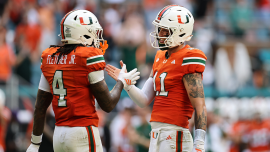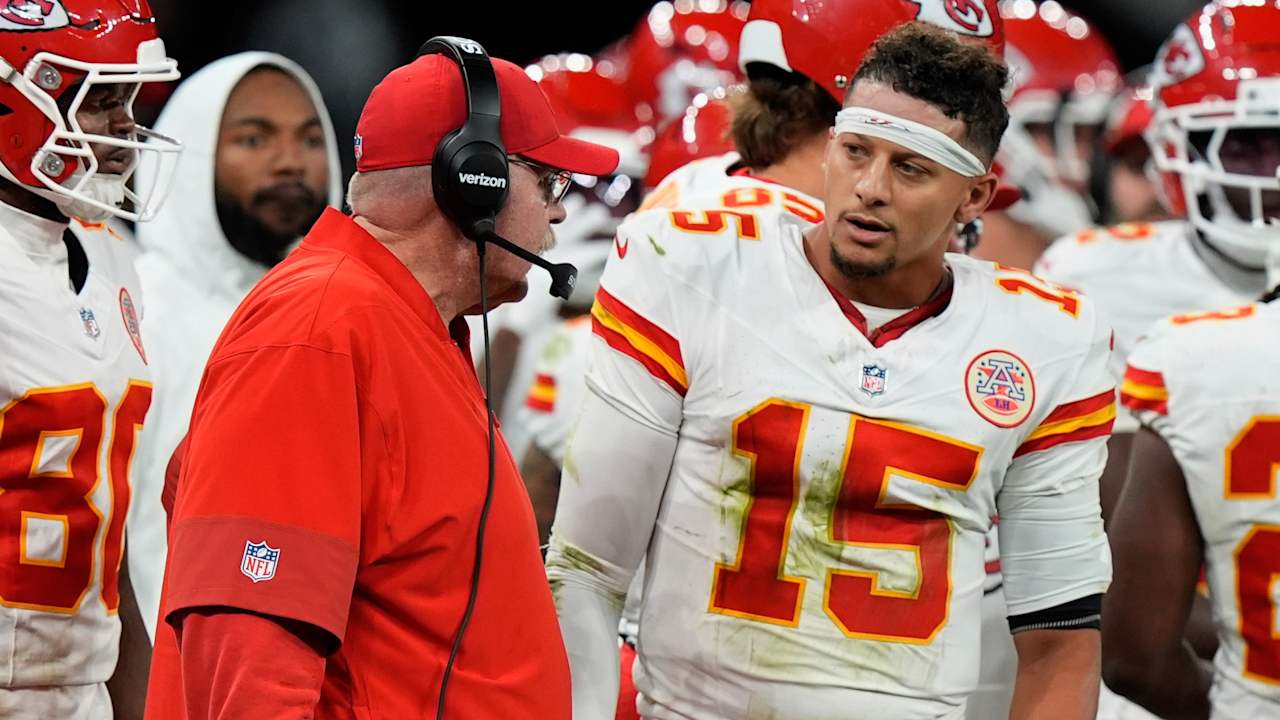It’s an incredibly simple concept, really: You need to spend money to make money.
We’ve all heard it repeated ad nauseam over the years, but it feels especially relevant in this current moment of college football.
UCLA and Virginia Tech kicked off the coaching carousel last weekend when they fired their coaches. The results were no surprise, though the timing might have come a little earlier than expected. As always, the moves prompted the flood of lists about who might take over those programs.
There’s really only one question that matters, though: Will they actually spend the money to be good?
Around the sport, limited resources have been cited repeatedly as reasons those programs haven’t delivered. UCLA’s financial issues are well-known and have essentially doomed it to failure. The school mishandled its most recent transition, too, trying to nudge Chip Kelly out instead of paying to fire him outright. Kelly bolted for Ohio State as offensive coordinator, and AD Martin Jarmond went the bargain route with alumnus DeShaun Foster, a career position coach. The outcome was predictable.
Virginia Tech at least has more history to point to, but those glory days feel long gone. The Hokies nudged out Frank Beamer, hired Justin Fuente, and then went 16-24 under Brent Pry. At the same time, Tech underinvested in personnel, facilities and NIL. AD Whit Babcock recently told the school’s board the Hokies would need to spend roughly $60 million more per year to actually contend at the top of the ACC. Look under the hood and the results aren’t shocking.
Spending doesn’t guarantee success. But in 2025, not spending almost guarantees failure.
Arkansas AD Hunter Yurachek put that tension in the spotlight this week when he told the Little Rock Touchdown Club the Razorbacks were built to win in basketball and baseball — but not football.
“Football, where we are right now, we’re not set up to win a national championship,” Yurachek said. “I’ll just be brutally honest with that. But I think we’re set up to compete really well in the Southeastern Conference, especially now with the new revenue-sharing model.”
The honesty landed poorly with Arkansas fans, but he wasn’t wrong. Every AD tries to sell the same dream of championships when introducing new coaches. Few back it up with the investments necessary to make it possible. Schools are scrambling to find new revenue streams to fund revenue sharing, yet the easiest way to make money in this sport remains the same: be really good.
Until UCLA and Virginia Tech make that kind of financial commitment, it almost doesn’t matter who they hire. The carousel will keep spinning, and they’ll remain stuck in the same cycle — irrelevant in the national pecking order until they decide what they actually want to be, and pay the price to get there.
The Six Pack: Picks for Miami vs. Florida, Oklahoma vs. Auburn and Tom Fornelli’s lock for Week 4
Tom Fornelli

Other Week 4 storylines
Indiana’s Mendoza could be first QB taken
I wrote earlier this week about why you need to know about Indiana defensive coordinator Bryant Haines and Illinois defensive coordinator Aaron Henry. Both could be head coaches in the future, and both have their hands full this weekend against top quarterbacks in a top-25 clash.
Of the two, Indiana’s Fernando Mendoza has first-round potential — matter of fact, he’s projected to go No. 1 overall in the latest mock draft from CBS Sports NFL Draft expert Mike Renner . He wasn’t nearly as well-known as some of his draft-eligible counterparts headed into the season, but he has already impressed in Curt Cignetti’s program. With other hyped QBs like Clemson’s Cade Klubnik, Penn State’s Drew Allar and South Carolina’s LaNorris Sellers struggling early on this season, Mendoza has a real chance to be the first or second QB taken if he can keep things up. NFL scouts have taken notice of what he’s doing in Bloomington.
Mendoza is a good decision-maker, accurate, quick release and has plenty of arm power to be dangerous across the field. The competition this season hasn’t been the stiffest, but he has still impressed with 708 passing yards, nine touchdowns and zero interceptions. I said it before the season and it feels even more true now: Mendoza could be the most impactful transfer portal addition of the year.
“You’ve got to have a guy that’s just got it, you know what I mean?” Cignetti told me this offseason. “And then build around him.”
Mendoza sure seems to have it, and Indiana did a good job of giving him enough offensive weapons to be dynamic this season. This will be the toughest test yet against an Illinois defense that did a very good job limiting Sellers a year ago in its bowl game, but so far, Mendoza has handled every challenge well.
For all the fans of QB-needy NFL franchises, you might want to tune in Saturday to watch Mendoza. If he keeps up what he’s doing right now, there’s a chance your favorite team will be drafting him very highly next spring.
The aggressive roster rebuild game
With one of the most expensive rosters in the game, No. 17 Texas Tech is all-in this season. Our Shehan Jeyarajah wrote a great piece on the Red Raiders’ ambitious plans and the millions spent to accomplish them. So far, the approach has worked wonderfully for the undefeated program. It faces a team this weekend that didn’t spend quite as aggressively this offseason (in fairness, no one did) but still made a big bold change.
Coming off a disappointing 5-7 season, No. 16 Utah knew it needed to revamp its offense. It decided on a package deal of New Mexico offensive coordinator Jason Beck and quarterback Devon Dampier, who have more than delivered so far at Utah. Dampier is one of the most electrifying quarterbacks in the country and has turned the Utes into a real playoff contender. He has completed 73 percent of his passes and has seven touchdowns with no interceptions.
These two teams look like the class of the Big 12 this season and both could push for playoff spots. It’s still early but each has proven, in its own way, how spending up on the right players can be all the difference.
Miami‘ massive recruiting weekend shows its staying power
If I didn’t trust the great Gaby Urrutia over at 247Sports, I would have immediately thought it was fake news. And even after seeing Gaby was the one who tweeted it, I still had to do a double take.
But, yes, No. 4 Miami expects six of the top 10 receivers, including the top four overall, to visit for the Hurricanes’ game against in-state rival Florida. It is a stunning assembly of talent this weekend in Coral Gables but it doesn’t stop at the receiver position. With College GameDay in town, Miami is also expecting to host players committed to Alabama, Oregon, Georgia and Ohio State, among other programs.
Miami is about to be a problem if it can keep this up. Head coach Mario Cristobal is one of the best recruiting head coaches in the country, Miami has plenty of money to play with and the results are finally playing out the way everyone hoped. Offensive coordinator Shannon Dawson has an offense that players want to be in. Miami has nailed its last two QB additions (Cam Ward, Carson Beck) and surely will be aggressive for a high-level starter again in the portal.
If the ‘Canes can keep winning, “The U” could be all the way back with an infusion of talent that doesn’t look like it’s stopping any time soon.
Salty Talty
Each week this space will be my airing of grievances, my opportunity to let the audience know what has been really grinding my gears. Hopefully it’ll be mostly college football-related, but it’s a good bet travel, family and other day-to-day life annoyances will find a way in.
What was once a quirky anomaly now risks becoming a problem — and a perfect example of college football leaders misunderstanding what makes their product special.
Arizona State and Kansas are in advanced talks to play at London’s Wembley Stadium next September, according to The Post and Courier’s Scott Hamilton. If finalized, it would be the third college football game in Europe next year, joining TCU–North Carolina in Dublin and Western Michigan–Michigan in Frankfurt.
Listen, London is a lovely place. And if my brilliant — and, lest I forget, very handsome — editors would like to send me across the pond, I’ll happily go.
But this feels like a step too far.
College administrators are once again borrowing from the NFL, which since 2007 has played in London, Mexico, Germany, Brazil and soon Ireland and Spain. The NFL makes more money that way — and if there’s one thing NFL owners love, it’s more money.
That’s fine for the NFL. But college football is different. The sport’s identity is built around home environments: the tailgates, the traditions, the fact that Saturdays in the fall double as the social lifeblood of entire communities. You take one of those games away, and you’re stripping something essential from the fans who pay rising season-ticket prices just to keep their seats. Asking them to tack on a $5,000 European vacation in September isn’t realistic.
It also just doesn’t translate the same way. NFL football is universal enough to sell overseas. College football is uniquely American. Try explaining 100,000 people watching “amateur” college kids to a European sports fan — it doesn’t compute.
Then there’s the football side. We’ve already seen the toll. Kansas State looked drained after Week 0 in Ireland this season. Florida State did the same the year before. The NFL has years of data showing teams often struggle after London trips. Now Arizona State and Kansas might sign up for the same fate — in Week 4, no less, when it could wreck the rest of their seasons.
Sure, traveling abroad is a once-in-a-lifetime experience for players. That’s why one annual showcase game makes sense. But three or more? That’s overkill.
College football doesn’t need to become a miniature, worse version of the NFL. Nobody’s asking for that. Fans love the sport for what it already is. Administrators would be wise to remember that before they start exporting it for good.
